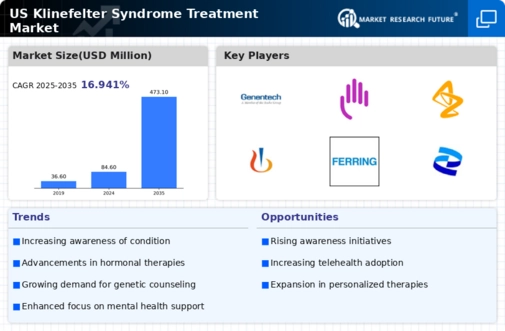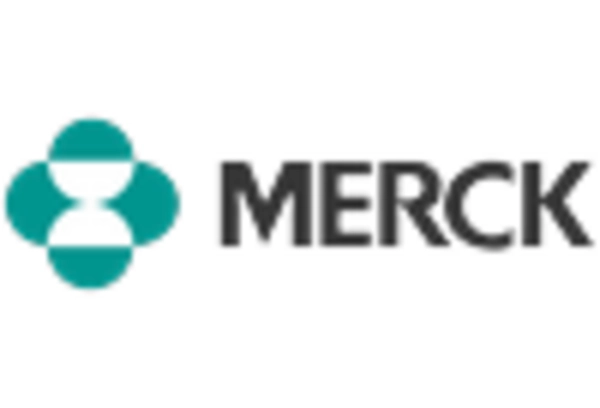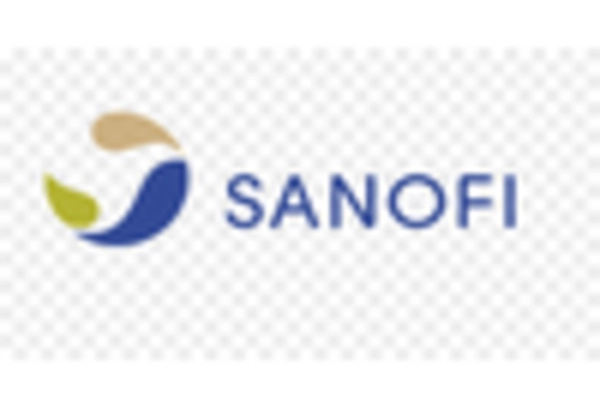Expansion of Treatment Options
The Klinefelter syndrome treatment market is expanding due to the development of a wider array of treatment options. Recent advancements in hormonal therapies, including testosterone replacement therapy, have shown promising results in improving the quality of life for individuals with klinefelter syndrome. Additionally, emerging therapies targeting specific symptoms, such as infertility and psychosocial challenges, are gaining traction. This diversification of treatment modalities is likely to attract more patients seeking effective management strategies for their condition. As the market continues to evolve, the availability of comprehensive treatment options will play a pivotal role in shaping the future of the klinefelter syndrome-treatment market.
Innovations in Diagnostic Technologies
Advancements in diagnostic technologies are significantly impacting the klinefelter syndrome-treatment market. The introduction of non-invasive prenatal testing (NIPT) and improved genetic screening methods have enhanced the ability to detect klinefelter syndrome early in life. These innovations facilitate timely diagnosis, allowing for prompt intervention and management of the condition. As a result, healthcare providers are increasingly adopting these technologies, which may lead to a higher number of diagnosed cases and, subsequently, an expanded market for treatment options. The integration of advanced diagnostic tools into clinical practice is likely to reshape the landscape of the klinefelter syndrome-treatment market, promoting better patient outcomes.
Increased Focus on Personalized Medicine
The klinefelter syndrome-treatment market is witnessing a shift towards personalized medicine, which tailors treatment approaches based on individual patient profiles. This trend is driven by advancements in genetic research and a deeper understanding of the condition's pathophysiology. Personalized treatment plans may include hormone replacement therapy, fertility treatments, and psychosocial support, all customized to meet the specific needs of each patient. As healthcare providers increasingly recognize the importance of individualized care, the klinefelter syndrome-treatment market is likely to expand, with a growing emphasis on developing targeted therapies that enhance patient quality of life.
Rising Incidence of Klinefelter Syndrome
The klinefelter syndrome-treatment market is experiencing growth due to the rising incidence of klinefelter syndrome among males. Recent estimates suggest that the condition affects approximately 1 in 600 male births in the US. This increasing prevalence is likely to drive demand for effective treatment options, as more individuals are diagnosed and seek medical intervention. The growing awareness among healthcare professionals regarding the symptoms and long-term implications of klinefelter syndrome contributes to earlier diagnosis and treatment initiation. Consequently, this trend is expected to bolster the klinefelter syndrome-treatment market, as healthcare providers focus on developing tailored therapeutic strategies to address the unique needs of affected individuals.
Growing Support from Advocacy Organizations
The klinefelter syndrome-treatment market benefits from the growing support of advocacy organizations dedicated to raising awareness and providing resources for affected individuals and their families. These organizations play a crucial role in educating the public and healthcare professionals about klinefelter syndrome, promoting early diagnosis and treatment. Their efforts contribute to a more informed patient population, which may lead to increased demand for treatment options. Furthermore, advocacy groups often collaborate with researchers and healthcare providers to facilitate clinical trials and studies, ultimately driving innovation within the klinefelter syndrome-treatment market.
















